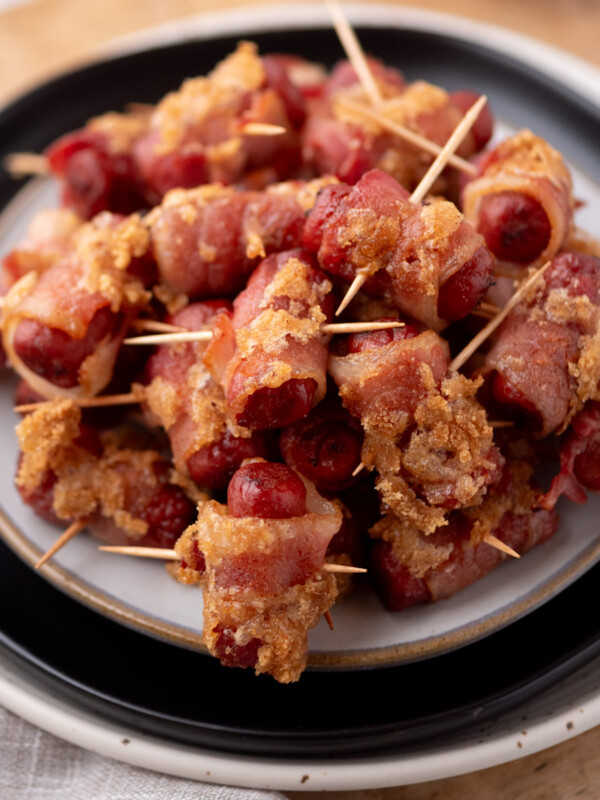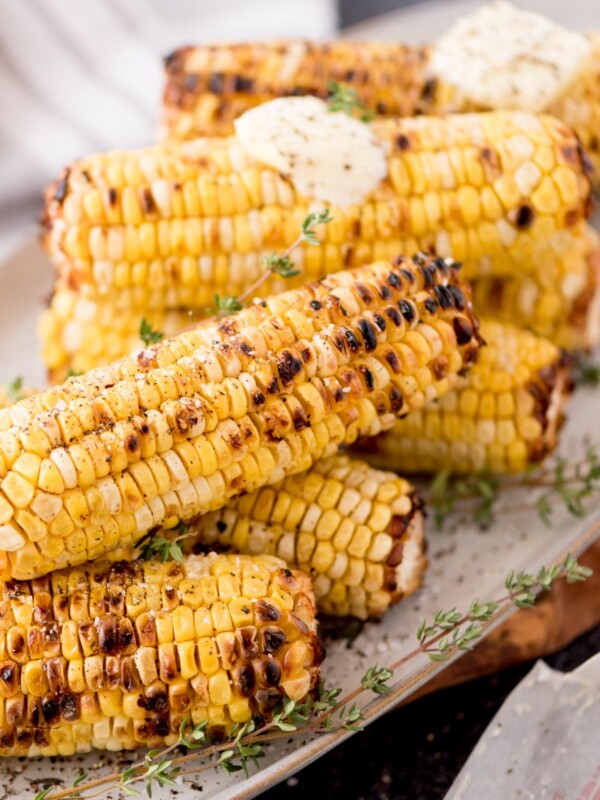Pit Boss Beer Can Chicken is the most tender, juicy chicken you’ve ever had! Everyone will love the smoky flavor.
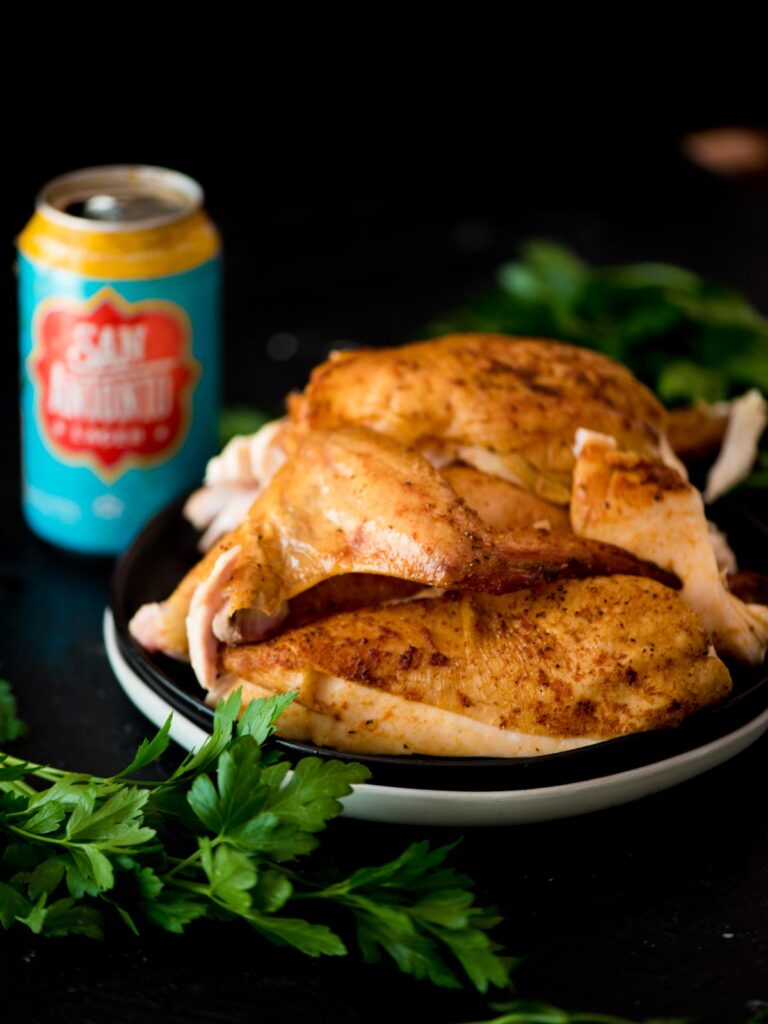
This post may contain affiliate links. This means if you decide to purchase through my link, I may earn a very small commission at no additional cost to you.
Best Beer Can Chicken Recipe
If you’ve never made Smoked Beer Can Chicken, let this be your invitation to the smokiest, juiciest, most tender chicken you’ve ever had.
You have got to make this chicken!
Beer can smoked chicken involves smoking the chicken with a whole can of beer inside of it.
It might sound weird, but you will be surprised at how much flavor the beer imparts into the chicken.
The alcohol does cook off during the smoking process, so no one will be getting drunk on this chicken. It’s all about infusing that malty, hoppy flavor without the booze.
Why you’ll love Pit Boss Beer Can Chicken
Everyone will be begging you to make this beer can chicken on a smoker again and again. It’s that good! Here’s why I think you’ll love it:
- It’s incredibly easy to make. If you’re new to smokers, this is a great smoker recipe to begin with.
- Everyone loves it. I swear you’ll get lots of requests to make this again! It will be everyone’s new favorite recipe for beer can chicken.
- The chicken is so tender and juicy. No more dried-out, bland chicken breasts. If you have leftovers, you can enjoy them with salads and tacos.
Smoked Beer Can Chicken Ingredients
Here’s what you’ll need to grab at the grocery store to make this smoked beer can chicken recipe for the best results.
- whole young chicken – You will need a 3-5 lb. bird for this recipe. Be sure to buy a chicken that has room to stand up in your smoker. Under 5 lbs. should do the trick!
- beer – You will need a 12 oz. can of beer for this recipe. Do not use a glass bottle or it might explode — make sure you are using one that comes in an aluminum can. I recommend a lager. See the section called “Best beer for beer can chicken” below for a few of my recommended brands.
You can make your own rub or use a store-bought rub. To make a homemade rub, you will need the following:
- brown sugar
- onion powder
- cayenne pepper
- smoked paprika
- garlic powder
- seasoned salt
- black pepper
You can use a binder if you feel like you need to (avocado and olive oil work well), but I don’t find it necessary. The rub sticks to the chicken really well on its own.
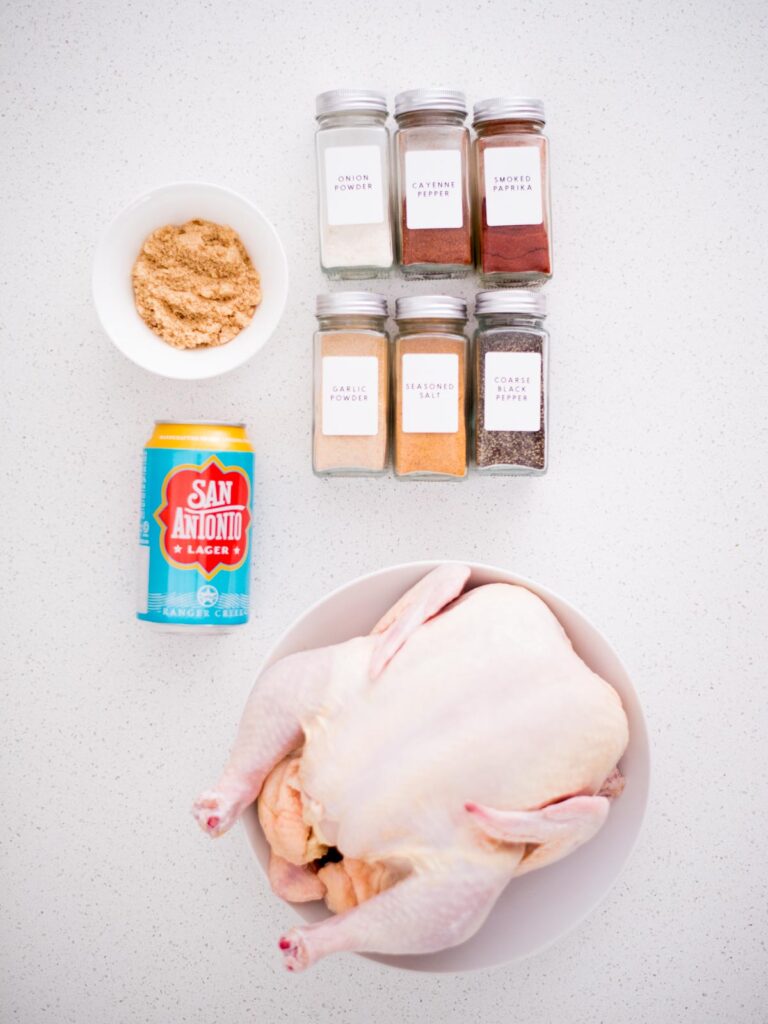
Best beer for beer can chicken
When making this smoked chicken recipe in an electric smoker, it is best to use a lager beer. The kind of beer will affect the overall flavor.
They have a light and bright beer flavor that isn’t too hoppy or cloying.
Lager beers are the most common type of beer in the world. Coors, Budweiser, Miller and Michelob are all lager beers.
Pilsners and Bocks are both types of lager beers, so you can use those too.
There are too many brands of lagers to name, so use your favorite beer if you have one. These brands of lagers are available nationwide:
- New Belgium Fat Tire
- Shiner Bock
- Lagunitas Pils
- Yuengling
- Pilsner Urquell
If you are planning to make tacos with your smoked chicken, you can use a Mexican lager such as Corona, Modelo, or Tecate. You can use fajita seasoning for the rub for extra flavor.
One thing to note — make sure your beer comes in an aluminum can. Do not use beer in a glass bottle or you risk it exploding in the smoker.
Beer Can Chicken Smoker Tools Needed
What pellets to use when smoking a beer can chicken
When you make Beer Can Chicken on a pellet grill, you can use most types of pellets.
Apple and cherry pellets work especially well for chicken because they are light and give off a gentle fruity flavor. Pecan pellets add a slightly nutty flavor. I like to use competition blend and mesquite pellets as well.
 Buy Now →
Buy Now → 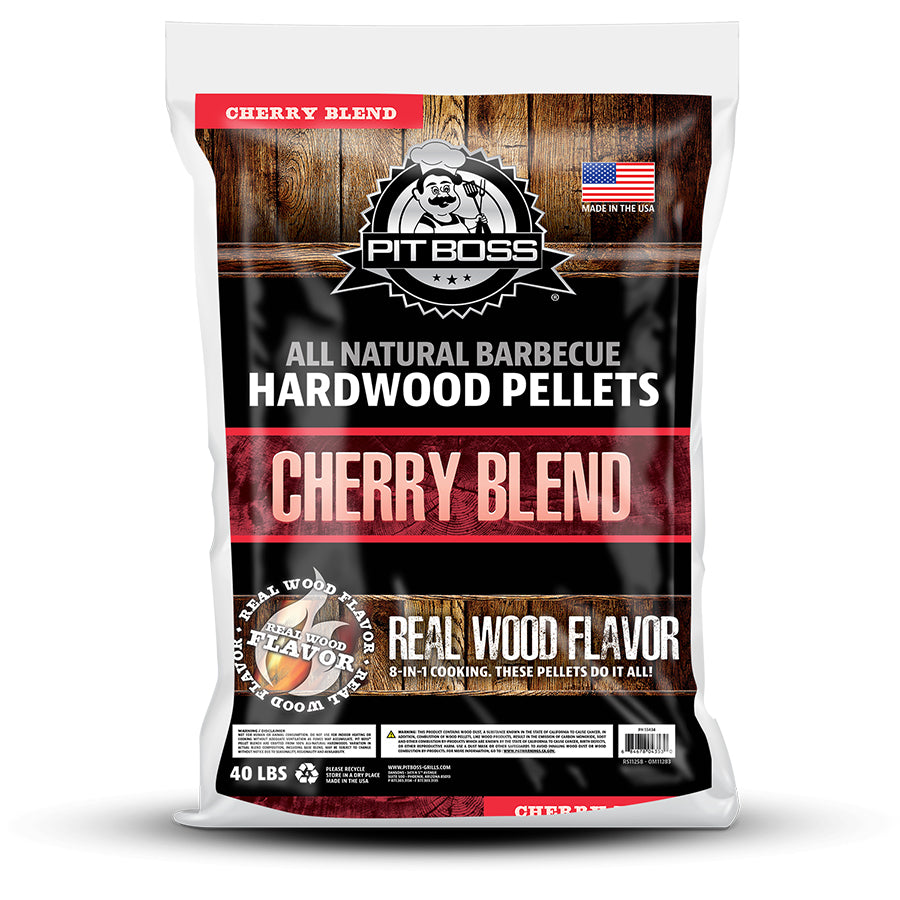 Buy Now →
Buy Now →  Buy Now →
Buy Now →  Buy Now →
Buy Now → Does smoked beer can chicken have to be made on a Pit Boss grill?
No, you can make smoked beer can chicken on any smoker that you’d like. You can use a Pit Boss pellet grill, a Traeger grill, or any other brand of pellet smoker you have.
Pit Boss Electric Smoker I use for Beer Can Chicken
 Buy Now →
Buy Now → How to make Smoked Beer Can Chicken
Making beer can chicken on a smoker is so easy. Here’s what to do:
- Preheat the electric smoker to a cooking temperature of 250ºF.
- Prep the chicken by removing it from the package and removing any of the parts (liver, giblets, etc.). Sometimes they are in a bag, but sometimes they are loose within the cavity of the chicken.
- In a small mixing bowl, combine the brown sugar, onion powder, cayenne pepper, smoked paprika, garlic powder, seasoned salt, and black pepper. Mix until it is fully combined.
- Add the rub to the chicken, coating the entire chicken. Be sure to add the rub underneath the skin as well.
- Open the beer and place it directly on the grill grates. Place the chicken upright over the can of beer. You can also use a chicken throne to make it easier.
- Smoke for 2 hours or until the internal temperature registers 165ºF. Make sure you use a wireless meat thermometer or the built-in temperature probe of your smoker to keep an eye on the chicken without opening the smoker too often and releasing all that good smoke.
- Remove the chicken from the smoker and allow it to cool 15 minutes before removing the beer can. This will also give the chicken the opportunity to rest completely before serving. Letting the chicken rest allows the juices to redistribute throughout instead of losing them when cutting into it.
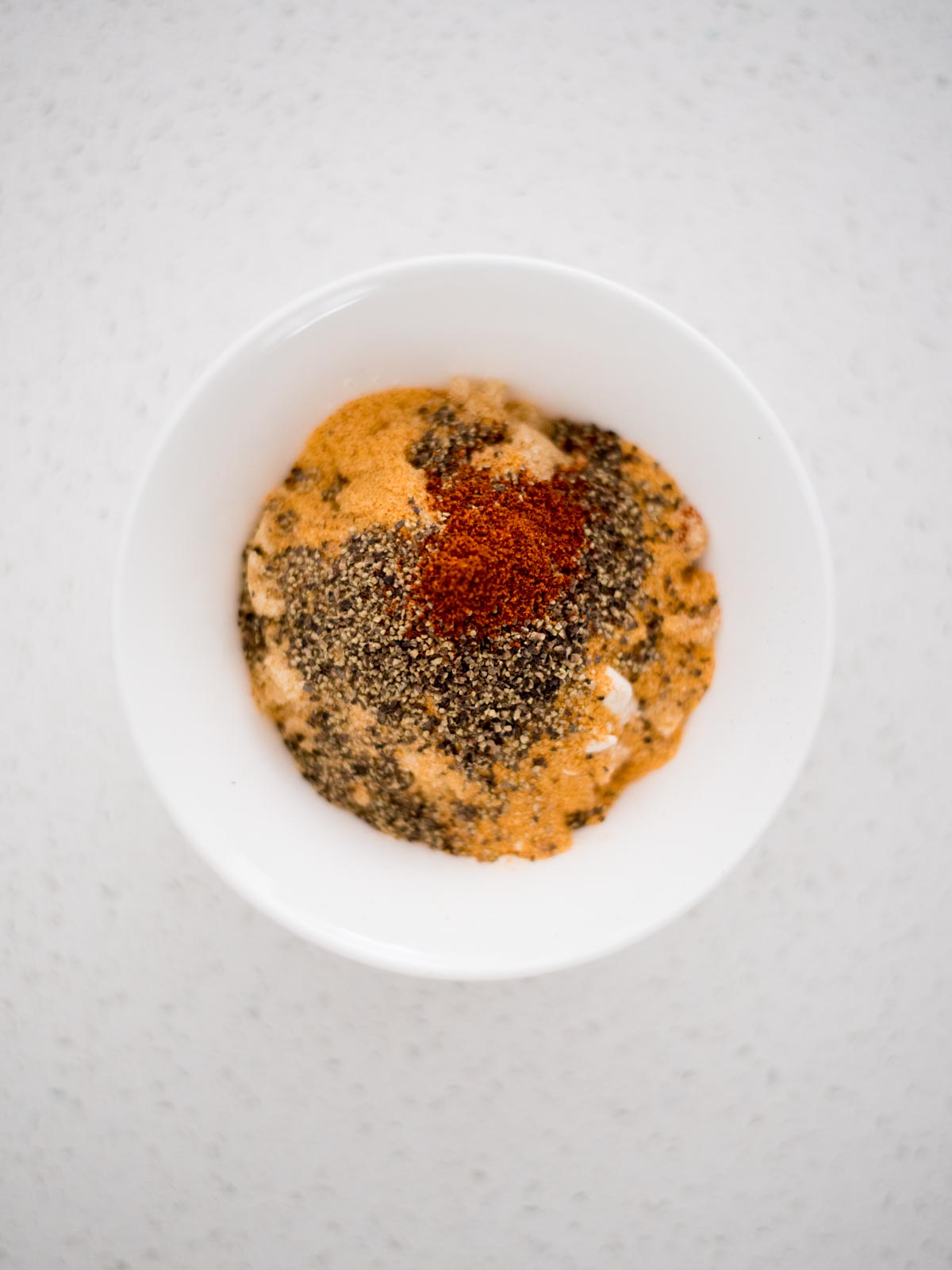
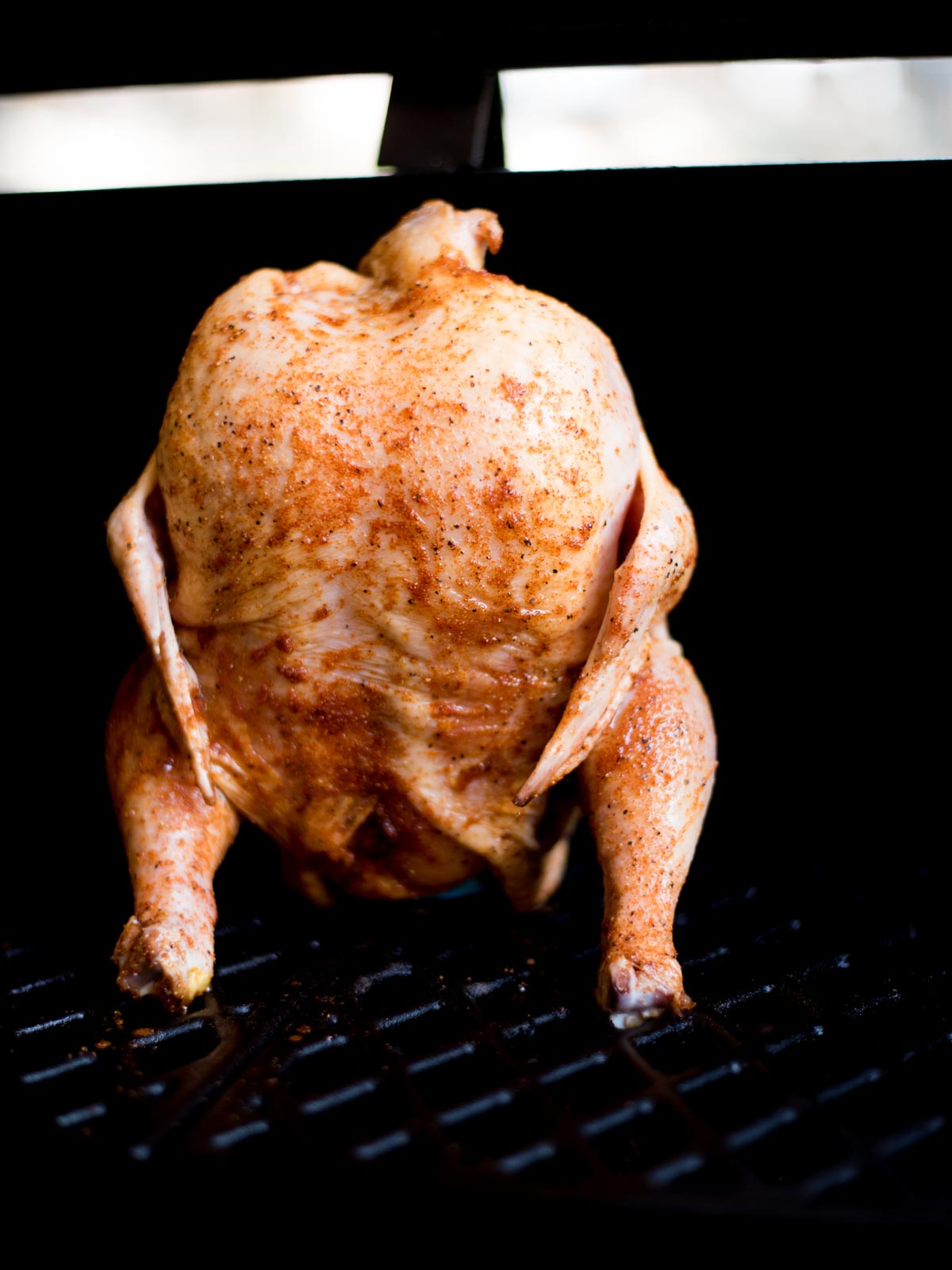
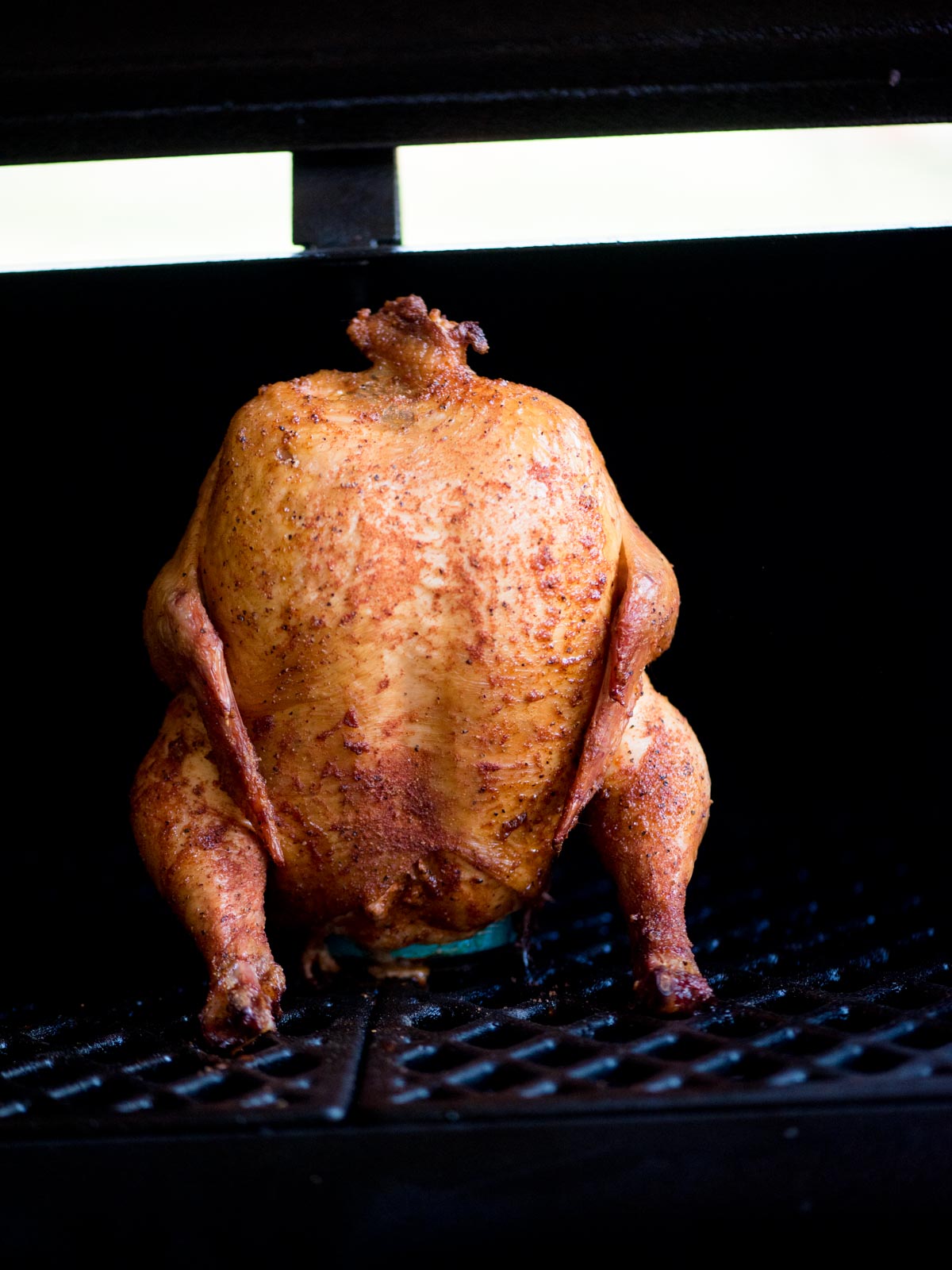
Beer Can Chicken Smoker recipe tips & tricks
Be sure to buy a chicken with room to stand up in your smoker. I recommend one that is 5 lbs. or less.
When adding the rub to the chicken, be sure to add it under the skin. This results in super flavorful meat with crispy skin.
How to get crispy skin on smoked chicken
When smoking chicken low and slow, it is more likely you will wind up with a tough, chewy, and rubbery chicken skin.
Higher temperatures will always help to crisp up the skin more, but this recipe cooks at a lower temperature.
At a low temperature, it’s important not to let extra moisture into the chicken. That’s why I don’t usually use an oil binder to adhere the rub — it adds too much moisture.
Once you add the chicken to the smoker, the sooner the moisture can leave the skin of the chicken, the sooner it can start crisping up!

Dry Rub for this Beer Can Chicken Smoker Recipe
While this recipe uses a homemade dry rub mix, you can also use a store-bought poultry rub blend if you prefer.
If you have a favorite seasoning, use that! These are some great options:
- Pit Boss Ale House Beer Can Chicken Rub
- Traeger Chicken Rub
- Weber Beer Can Chicken Seasoning
- Kosmos Beer Can Chicken Rub
What to Serve with Beer Can Smoked Chicken
Beer Can Smoked Chicken is excellent served with other smoked items. You can even make them at the same time on the smoker! Some great options are:
Storing Pit Boss Beer Can Chicken
For any leftover smoked chicken, allow it to cool completely and then place it in an airtight container.
When stored properly, it will stay fresh for up to 3 days in the refrigerator.
Smoked Beer Can Chicken FAQs
Sometimes you’ll see recipes for beer can chicken that suggest removing the entire top of the can, allowing more of the beer steam to come out. I do not recommend this method because it makes the can less stable and the chicken can fall over, with the hot liquid beer spilling all over your pellets.
If you do feel like you need it to have more area to release the steam, you can poke extra holes in the top of the beer using a church key-style opener.
At 250ºF, a whole chicken can be smoked for about 2 hours. It takes longer to smoke a whole chicken than it does to grill a chicken because smokers use indirect heat.
The internal temp for smoked chicken should always be 165°F before removing it from the heat.
To check the temperature, of the chicken, you will want to insert a meat probe or instant read thermometer into the thickest part of the breast. This will give you the internal temp for smoked chicken.
According to Smoked Barbecue Source, most pellet smokers will burn between 1 and 3 lbs. of pellets per hour.
It all depends on the set temperature and the grill’s make and model, so keep an eye on your pellets while you grill and use the right temperature.
You use a full can of beer for beer can chicken with just a small amount poured out initially to keep it from flowing over.
More Smoker & Pit Boss Recipes
- Pit Boss Ribs
- Smoked Macaroni & Cheese
- Smoked Baked Beans
- Smoked Burgers
- Smoked Queso Dip
More Favorites from Sweetly Splendid
Smoked Beer Can Chicken Recipe
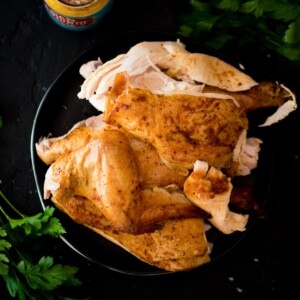
Ingredients
- 5 pound whole young chicken
- 12 ounces lager beer
- 3 tablespoons brown sugar
- 1 teaspoon onion powder
- ½ teaspoon cayenne pepper
- 1 teaspoon smoked paprika
- 1 teaspoon garlic powder
- 1 teaspoon seasoned salt
- ½ teaspoon black pepper
Instructions
- Preheat the electric smoker to a cooking temperature of 250ºF.
- Prep the chicken by removing it from the package and removing any of the parts (liver, giblets, etc.). Sometimes they are in a bag, but sometimes they are loose within the cavity of the chicken.
- In a small mixing bowl, combine the brown sugar, onion powder, cayenne pepper, smoked paprika, garlic powder, seasoned salt, and black pepper. Mix until it is fully combined.
- Add the rub to the chicken, coating the entire chicken. Be sure to add the rub underneath the skin as well.
- Open the beer and place it directly on the grill grates. Place the chicken upright over the can of beer. You can also use a chicken throne to make it easier.
- Smoke for 2 hours or until the internal temperature registers 165ºF. Make sure you use a wireless meat thermometer or the built-in temperature probe of your smoker to keep an eye on the chicken without opening the smoker too often and releasing all that good smoke.
- Remove the chicken from the smoker and allow it to cool 15 minutes before removing the beer can. This will also give the chicken the opportunity to rest completely before serving. Letting the chicken rest allows the juices to redistribute throughout instead of losing them when cutting into it.
Nutrition
Nutrition information is automatically calculated, so should only be used as an approximation.

